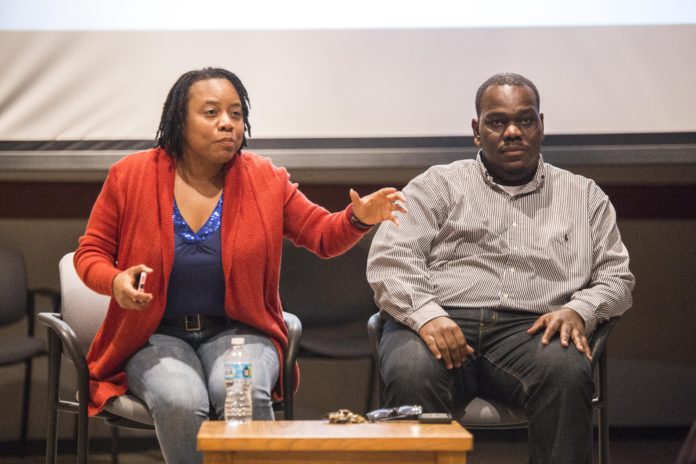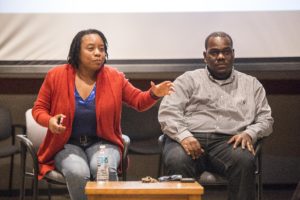

Less than 24 hours after Donald Trump was declared president-elect, professors of political science, Clarissa Peterson and Emmitt Riley, opened their pre-planned colloquia talk with a qualifier.
The session was originally meant to focus on the role of technology in the Black Lives Matter movement, but the emphasis shifted in light of recent political events.
The talk began as planned with a ten-minute compilation of police brutality clips. In Minnesota, Philando Castile bleeds to death in his car, while his girlfriend sobs but holds her phone steady, her daughter sits in the backseat unseen and unheard, and officer Jeronimo Yanez shrieks curses and continues to hold them at gunpoint. In Texas, officers crash a pool party. Officer Eric Casebolt is frantic, screaming at black children in swimsuits to get on the ground while their white peers stand and film the incident unharassed.
“Look at the people who are free to move, look at the people who are free to talk, and look at the people who are forced to lay on the ground,” Peterson said. The video showed Casebolt slam an unarmed 15-year-old black girl in a bikini on the ground, pushing her face into the ground with his hands, and then kneeling into her back. Her cries draw the attention of friends who come running to help her up, and then the officer draws his gun.
“If she told her story, if all those black kids told their story, nobody would believe them,” Peterson said. “Now that we have this kind of information captured, we get the rest of America believing.”
The capturing of these videos does not necessarily translate to support for the Black Lives Matter movement said Peterson.
Peterson and Riley opened the floor for questions, and the conversation changed immediately to the election results.
“What does it fundamentally mean to have an overt racist in office, who’s playing footsie with the KKK?” Riley asked. He commented that this election outcome can be seen through the lens of racialization theory.
The theory states if voters perceive that something is going to benefit a black community, they find it to be racialized. Clinton had been embracing these controversial issues in a direct way, which Riley said made her become racialized thus costing her white voters.
When a student asked if there was something positive that may have came out of this election, Riley replied, “It really told us who the racist, sexist, xenophobic, homophobic people in our society are,” adding that there is value in “knowing who the devil is.”
Riley further said he is tired of explaining the concept of racism to white people. “There is no pride in having to articulate the statement ‘black lives matter’ when there is a man of color in the highest office in the land,” Riley said.
Unsurprised by the Trump victory, the professors explained how the president-elect was able to pull it off. Peterson commented that not only did Trump secure the vote of uneducated, white women and increase support in rural areas over previous Republican candidates, but he also attracted the higher educated, but closeted, white voters. He attracted this group of people who “are smart enough to not tell us they were voting for Trump,” Peterson said.
While speculating about the next four years, Riley said often when government is unified under one party, it can act too quickly for the country and backlash may follow. Riley also mused that Trump “has finessed his way without presenting a single plan… when he is unable to deliver to these rural white voters, what is going to happen?”
“That’s the tragedy of this election,” Peterson said. “We let craziness, stupidity, and outrage become normal. And though they are crazy out there, we want to be right in here.”
